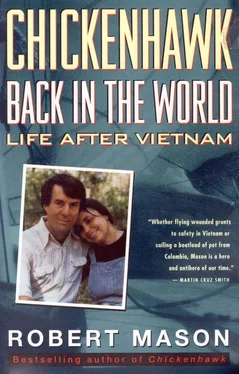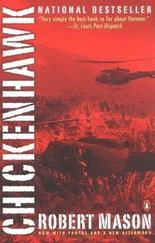Robert Mason - Chickenhawk - Back in the World - Life After Vietnam
Здесь есть возможность читать онлайн «Robert Mason - Chickenhawk - Back in the World - Life After Vietnam» весь текст электронной книги совершенно бесплатно (целиком полную версию без сокращений). В некоторых случаях можно слушать аудио, скачать через торрент в формате fb2 и присутствует краткое содержание. Год выпуска: 2013, Издательство: BookBaby, Жанр: Старинная литература, на английском языке. Описание произведения, (предисловие) а так же отзывы посетителей доступны на портале библиотеки ЛибКат.
- Название:Chickenhawk: Back in the World - Life After Vietnam
- Автор:
- Издательство:BookBaby
- Жанр:
- Год:2013
- ISBN:нет данных
- Рейтинг книги:3 / 5. Голосов: 1
-
Избранное:Добавить в избранное
- Отзывы:
-
Ваша оценка:
- 60
- 1
- 2
- 3
- 4
- 5
Chickenhawk: Back in the World - Life After Vietnam: краткое содержание, описание и аннотация
Предлагаем к чтению аннотацию, описание, краткое содержание или предисловие (зависит от того, что написал сам автор книги «Chickenhawk: Back in the World - Life After Vietnam»). Если вы не нашли необходимую информацию о книге — напишите в комментариях, мы постараемся отыскать её.
Chickenhawk: Back in the World - Life After Vietnam — читать онлайн бесплатно полную книгу (весь текст) целиком
Ниже представлен текст книги, разбитый по страницам. Система сохранения места последней прочитанной страницы, позволяет с удобством читать онлайн бесплатно книгу «Chickenhawk: Back in the World - Life After Vietnam», без необходимости каждый раз заново искать на чём Вы остановились. Поставьте закладку, и сможете в любой момент перейти на страницу, на которой закончили чтение.
Интервал:
Закладка:
“I’d like to get a boat like this someday,” I said.
“You like this sailing shit, eh?” John said.
“Yeah. Patience and I could fit it out with a couple of desks. Go where we wanted. Write.”
“Not me,” Ireland said. “When I get my money, I’m going to buy some land. Build a little house. The only sailing I want to do is on a windsurfer. On a lake.”
The next day, the storm was past and the wind was strong and steady. The Namaste cruised at five knots. I came up on deck and saw John sitting in the cockpit, naked. A plastic bucket by his side, he was lathering himself with Joy. Lemon Joy is the only detergent that makes suds in seawater, so I’m told. The sight made me cringe. I’ve always had this phobia about letting salt water dry on my skin. I used to spend half my life playing in the surf as a kid in Delray Beach, but we had public showers at the beach to rinse off the salt water. If I didn’t rinse
off, the drying salt water would tighten my skin and leave a crust of salt that clung to my clothes when I got dressed and made me itch. I scratched the back of my neck. I was risking my life and my freedom on this trip, but getting sticky was my big fear at the moment.
“Hey, Bob,” John said as he stood up. “I don’t mean to get personal, but you haven’t bathed since we left. That swim was it. What’s that? Four, five days ago?” He wrinkled his nose. I watched him hold the bucket over his head and rinse himself off with seawater. He tossed the empty bucket overboard and pulled it back in with the rope tied to the handle and repeated the process.
“Yeah, I know. I can’t even stand myself,” I said.
So when John finished, I stripped off my shorts, got a bucket of water, and gave myself a bath in the cockpit. I rinsed, went below, and dried off with a towel. Then I waited for the stickiness to set in. I put on clean jeans and a T-shirt and went on deck. When I put my hand in one of the pockets, I felt a piece of paper. A note from Patience: “I love you, the Phantom Phantom.” I saw she’d drawn a little-girl face with a big smile. I smiled, picturing my phantom. Fifteen minutes later I didn’t feel my skin clinging to my clothes. A half hour later, I’d forgotten my revulsion. I felt fresh and clean. Maybe it was the Lemon Joy.
We had two fishing lines out, hooked to lures we’d made from frayed nylon rope. The ends of the lines were tied to short boards we used for reels. The boards were anchored, jammed against the winches, but the lines were held on to the safety lines with clothespins so that if we got a strike, a clothespin would let the line go and we’d know we had something on. The clothespins let go now and then. Usually it was seaweed. I saw a clothespin snap off the railing and grabbed a board. I yelled that we had something and wound the line onto the board, like a kid with a kite. Two hundred feet behind us, a giant tuna leapt out of the water. Really huge: this … big. His skin shimmered like a rainbow in the sun. He leapt clear of the water, shuddering with fury, trying to shake the hook. I held on to the board, not winding, just trying to keep hold of it. John and Ireland were running around looking for a gaff hook. When I felt a slack, I wound on more line. John grabbed my camera and took pictures of the fight. About a half hour later, we had a goddamn big tuna whipping around at the stern of the boat and under the boat, swimming in small circles, tangling the line on the prop. We couldn’t get him in, so we waited until he got tired and stopped struggling. When we dragged him on board, we saw he was about four feet long, weighed maybe forty pounds. He flopped around on deck while I tried to stab a knife into his brain. Thunk. Thunk. Quiver. Dead. Lots of blood.
“Wow!” Ireland said. “We eaty fishy tonight, no?”
“No shit!” John said.
I felt sad watching the tuna’s rainbow skin fade as it died. I said a thank-you to his spirit, something I’d picked up reading about Indians. This was something special here, a life. I was taking a life to nourish my own. I forget that when I order tuna at a restaurant.
Unfortunately, the sea picked up while I cleaned the fish. I’d chopped him into thick steaks—damn big steaks that’d cost you twenty bucks apiece on shore—put the steaks in a pan, basted them with lemon juice and butter, and put them in the stove to broil. The bottom of the gimbaled stove leaned into the aisle because we were sailing with the rail underwater. The Namaste pitched and wallowed as the storm picked up. It was a real challenge cooking the steaks, but just the smell of them broiling made it worth the effort. By the time I’d finished, though, both Ireland and John were feeling the sea and didn’t want to eat.
I sat under the dodger, on my watch, and ate the best tuna I’d ever tasted. John and Ireland stayed below, weathering their stomachs.
CHAPTER 15
We sighted land at dusk of the fifteenth day. Before it got dark, we could make out El Yunque, a thirty-five-hundred-foot mountain on the west end of Puerto Rico, and across from it, the fifteen-hundred-foot peak of Crown Mountain, which is what Saint Thomas is—a mountain sticking out of the sea. Land lights flickered through the sea air and I wanted to be ashore. I wanted a hot shower. I wanted Patience.
The wind was strong, the sea rough. I noticed that we all walked around on deck as if on land, a big difference from when we started two weeks before. I guess we’d developed what they call sea legs. The Namaste closed the distance to Saint Thomas about an hour after we sighted land. John was below checking the charts. Ireland and I joked about island girls and whatnot. We were free of worry. We had nothing to hide, nothing on board anybody wanted. The trip down was like a rich man’s cruise. From now on, things would be different. Saint Thomas was the initial point on the sortie to Colombia. That’s how I saw it. Part of a mission. With teamwork, timing, strategy, luck, it could work. Just getting to Saint Thomas, through those storms, was impressive to me. The Namaste was tough and so were we. Two weeks in a rough sea will tighten up every loose muscle you have. My stomach was steel outside, jelly inside.
John checked his chart and pointed out the channel markers as we motored close to land. He used the spotlight he’d bought for the trip to sight the channel markers. The thing lit up half the world when he switched it on. He said we’d come in on the west side of the island, get out of the wind. The wind diminished to lazy breezes as we sailed into the island’s lee. We dropped sail and, with fingers crossed, cranked the engine. Started right up. We cruised into a cove near David Point, far from the lights we’d seen on the north side. Bob went forward and got the anchor ready. When John gave the word, Bob tossed in the anchor. John switched off the engine. The anchor line tightened. The Namaste swung around, aligning herself with the breeze. She rocked gently, contented, I thought.
We dragged out the inflatable dingy. Bob pronounced it stressing the g. Din-GEE. “Blowing up the din-GEE,” he said. “The dingers blow up the din-GEE.” Didn’t take long: we had a foot-powered air pump. Got the thing inflated and threw it overboard. John said Ireland should stay on board while he and I went ashore to get provisions. He meant he wanted to get some beers. He’d been out for two days. He was sober, joked around less, talked less doublespeak.
We were only a couple of hundred yards off, and it didn’t take long to row ashore. John rowed. “Tomorrow we go around to the south side, to the main harbor. I don’t like to come in around all those boats at night,” he said, stroking.
“There’s lots of boats there?’’
“You won’t believe it.”
“What’s here?” I said, pointing to the moonlit beach.
Читать дальшеИнтервал:
Закладка:
Похожие книги на «Chickenhawk: Back in the World - Life After Vietnam»
Представляем Вашему вниманию похожие книги на «Chickenhawk: Back in the World - Life After Vietnam» списком для выбора. Мы отобрали схожую по названию и смыслу литературу в надежде предоставить читателям больше вариантов отыскать новые, интересные, ещё непрочитанные произведения.
Обсуждение, отзывы о книге «Chickenhawk: Back in the World - Life After Vietnam» и просто собственные мнения читателей. Оставьте ваши комментарии, напишите, что Вы думаете о произведении, его смысле или главных героях. Укажите что конкретно понравилось, а что нет, и почему Вы так считаете.












